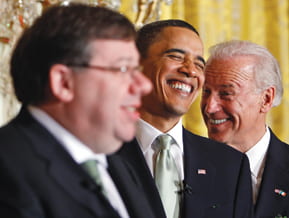 These are serious times for our country — from challenges abroad, to our crippled economy, to the tragedy in the Gulf of Mexico. With events filtered through a partisan midterm election and a heat wave smothering the nation’s capital, it seems the first thing to wilt is Washington’s sense of humor.
These are serious times for our country — from challenges abroad, to our crippled economy, to the tragedy in the Gulf of Mexico. With events filtered through a partisan midterm election and a heat wave smothering the nation’s capital, it seems the first thing to wilt is Washington’s sense of humor.
Jon Stewart, David Letterman, Jay Leno and the rest of the late-night crowd continue to hold their own. But the ability of elected officials to indulge in a good collective laugh — not to make light of serious situations but to ease tensions — has become a too-rare civility in modern political life. It is not an overstatement to say that the country suffers for all of the endless indignation and offense.
Partisan tensions, of course, are nothing new in American life. Thomas Jefferson, back in 1801, at his first Inauguration, exhorted his fellow leaders to keep in mind that “every difference of opinion is not a difference in principle.”
Nearly a century later, the satirist Ambrose Bierce made clear that goal remained elusive: “What is a Democrat? One who believes that the Republicans have ruined the country. What is a Republican? One who believes that the Democrats would ruin the country.” It hardly helped when his contemporary, Henry Adams, seconded the notion by calling politics “the systematic organization of hatreds.”
Those words, unfortunately, ring all too true in the modern era. We live in a society of 24/7 news and instant communication. Our political system is increasingly defined by the frenetic search for campaign cash. Our greatest policy minds grapple with a mounting U.S. debt and its effect on the ability of government to address people’s problems. Against this backdrop, respect and congeniality have largely gone missing in politics and risk becoming artifacts of a bygone era.
If I had my way, we’d carve the words of Hubert Humphrey into the Capitol Dome. On Nov. 3, 1977, he was the first sitting senator to address the House in regular session. He was late in life and dying of cancer. Fight every battle as if the world depended on victory, he told the House. But after all is said and done, go over and shake your opponent’s hand.
Your enemy today may be your ally tomorrow, he said. Don’t burn your bridges.
Bipartisanship seems to have become a four-letter word — the act of sell-outs and betrayal of “the team” — rather than the fine art of compromise and the essential act of getting things done. That’s a dangerous place for us to be as a country.
U.S. influence around the world is rooted in our democratic values — which include respect for different points of view and the ability to work together without resorting to violence or abandoning the rule of law.
Defining victory as political points scored rather than real progress achieved makes our country weak and ineffectual. If we remain distracted by our differences, the world will pass us by.
There are, no doubt, deep and genuine divisions between the parties. And the notion of a loyal opposition is a healthy one in any democracy. The looming question is, do we have the will — indeed, the capacity — to reach common ground where it is required?
One of the most underestimated tools in politics, leadership and life is a sense of humor — the ability to laugh not just at others but at ourselves. More than ever, we need humor’s deflationary influence in the nation’s capital. It’s an essential release valve, a check on all the overheated rhetoric and a bridge to real dialogue.
Mark Twain got it right when he said, “against the assault of laughter nothing can stand.”
Humor alone can’t solve our problems. But it can open the door to greater civility, a little more humanity and some much-needed productivity in our nation’s governance.
The original text of Dan Glickman’s article can be read on POLITICO.com